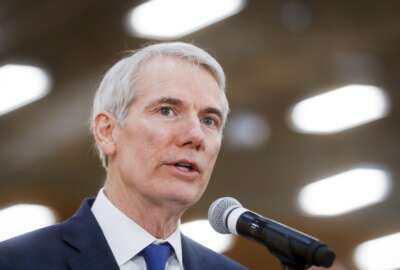
Sen. Lankford: Yearlong continuing resolution to avert shutdown ‘terrible likelihood’
When it comes to avoiding wasteful spending in government, avoiding government shutdowns stands out as some of the lowest-hanging fruit.
When it comes to avoiding wasteful spending in government, avoiding government shutdowns stands out as some of the lowest-hanging fruit.
That’s why Sen. James Lankford (R-Okla.), a member of the Senate Appropriations Committee and a ranking member of the Senate Homeland Security and Governmental Affairs Subcommittee on Regulatory Affairs and Federal Management, has made avoiding future shutdowns a top priority in the latest edition of his “Federal Fumbles” wastebook.
“Our goal is [that] we don’t have shutdowns, number one, so federal families don’t feel the effect of this. Number two: If we have a [continuing resolution], it’s short, and so would get it resolved and then press on with appropriations,” Lankford told reporters in his office Monday.
The fifth annual wastebook found that the three most recent government shutdowns — which shuttered operations at agencies for a total of 52 days — cost agencies at least $4 billion.
The 35-day partial government shutdown that ended in January led to more than $3 billion in back wages for furloughed employees, according to the Congressional Budget Office, and resulted in an estimated $2 billion loss of revenue from IRS tax enforcement.
However, the Senate faces a major time crunch to reach a comprehensive spending package before the current deadline of Dec. 20.
Lawmakers have three weeks until the deadline, and Lankford said they’ll need about two weeks to draft the appropriations bills for the rest of fiscal 2020.
“If we don’t get a resolution this week, we will not have appropriation bills for the 20th of December,” Lankford said. “It could be resolved now, but whether the House and Senate leadership can actually sit down and work through this in the middle of the impeachment time and they’ll actually put the focus on getting a result, I don’t know.”
But with that condensed window of time, some lawmakers have proposed a long-term CR for the remainder of the fiscal year. Lankford called a yearlong CR “a terrible likelihood,” but one he wouldn’t endorse, because of the strain that would put on the Defense Department and civilian agencies.
“I would oppose a yearlong CR, because a yearlong CR puts everybody in a really bad position,” he said. “Every agency complains that they spend all their time on budgeting and paperwork, rather than vision-casting and oversight, and doing the work they need to do. So while the line employees are still at their desks and still working, all of the executive-level that should be doing all the planning, all the oversight and everything else, are now doing budget work 24/7. We have to resolve it.”
In many cases, a long-term CR wouldn’t put agency operations on auto-pilot without consequences. Agencies that rely on seasonal or temporary work, Lankford said, wouldn’t have the budget authority under a yearlong CR to make those hires.
“They’re gone, they can’t be carried through in the CR,” Lankford said. “And so, all those agencies that need temporary help behind the scenes on whatever it may be are all stuck without the additional hands because we have a CR.”
While Lankford serves on the Senate Appropriations Committee, much of the deliberation right now centers on Sens. Shelley Moore Capito (R-W.V.) and Jon Tester (D-Mont.), the chair and ranking member, respectively, of the Appropriations Homeland Security Subcommittee, because of partisan conflict over spending for a border wall between the U.S. and Mexico.
Related Stories
“Appropriations has become a frustrating place, only because the bills really aren’t coming to the floor. They’re really not being amended in committee, so much of the decision making is happening on the senior level, and everyone’s a spectator,” Lankford said.
If Congress fails to reach a spending deal before the Dec. 20 deadline, Lankford urged his colleagues to reconsider the Prevent Government Shutdowns Act. The bill, which made it out of committee in June, would keep agencies from shuttering operations through an automatic continuing resolution that would kick in whenever Congress fails to pass a comprehensive spending bill.
As an extra incentive for lawmakers to reach a spending deal, the bill would also prohibit lawmakers from tapping into federal funds or campaign funds for official travel during a lapse in appropriations.
“If we’re all here until we get it resolved, we would have resolved this months ago,” Lankford said. “We wouldn’t have had an eight-week CR, we wouldn’t have had another four-week CR. We would’ve already resolved it.”
Copyright © 2025 Federal News Network. All rights reserved. This website is not intended for users located within the European Economic Area.
Jory Heckman is a reporter at Federal News Network covering U.S. Postal Service, IRS, big data and technology issues.
Follow @jheckmanWFED





